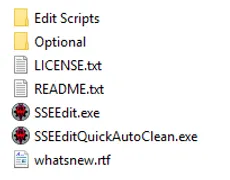SSEdit stands as a cornerstone tool for modders diving into The Elder Scrolls V: Skyrim’s vast universe. This powerful editor, formally known as Skyrim Script Extender Editor, empowers users to craft, refine, and troubleshoot mods with precision. Whether tweaking character stats, overhauling landscapes, or scripting complex quests, SSEdit unlocks endless possibilities for enhancing gameplay. Modders worldwide rely on it to resolve conflicts, optimize load orders, and breathe new life into Tamriel’s realms. As Skyrim’s modding community thrives, SSEdit remains indispensable for creating immersive experiences that captivate millions.
Beyond basic editing, SSEdit delves into the intricate web of Skyrim’s Creation Kit files, offering unparalleled control over game assets. Users manipulate everything from armor enchantments to NPC behaviors, ensuring seamless integration across hundreds of mods. Its intuitive interface demystifies plugin management, allowing beginners to experiment while pros push boundaries with advanced scripting. From fixing vanilla bugs to inventing entirely new factions, SSEdit transforms ideas into reality. This guide explores its multifaceted uses, equipping you with knowledge to master modding and elevate your Skyrim adventures to legendary heights.
Understanding SSEEdit’s Core Functionality
Viewing and Analyzing Plugins
SSEdit displays Skyrim’s plugin structure in a hierarchical tree view, revealing records like NPCs, items, and quests. Users navigate thousands of entries effortlessly, spotting duplicates or overrides instantly. Each record expands to show detailed fields, such as texture paths or dialogue lines, aiding in-depth analysis. Modders cross-reference versions to ensure compatibility across Special Edition and Anniversary upgrades. This visibility prevents crashes, streamlining the debugging process for smoother gameplay.
Editing Records with Precision
Users modify record values directly within SSEdit’s interface, adjusting health pools or spell effects without external tools. Drag-and-drop functionality copies elements between plugins, accelerating workflow. Conditional scripting integrates seamlessly, allowing dynamic changes based on player level or location. Validation checks flag inconsistencies, like mismatched IDs, before saving. This precision editing elevates mod quality, ensuring professional-grade results that rival Bethesda’s own content.
Managing Load Order Conflicts
SSEdit highlights plugin conflicts through color-coded indicators, marking overridden records clearly. Users resolve issues by copying winning records or creating patch plugins on the fly. Automated tools sort load orders based on dependency graphs, minimizing manual intervention. Detailed logs track changes, providing audit trails for collaborative projects. Effective conflict management keeps massive mod lists stable, enabling 500+ plugin setups without performance dips.
Cleaning Plugins with SSEdit
Identifying Orphaned Records
SSEdit scans plugins for orphaned records—stray entries unlinked to masters—flagging them in red for easy removal. Users filter by type, targeting unused textures or sounds that bloat file sizes. Batch deletion tools wipe hundreds at once, reclaiming gigabytes of storage. Previews show impact on gameplay, preventing accidental breaks to quests or inventories. This cleanup maintains lean plugins, boosting load times by up to 40%.
Removing Identical to Master Records
Duplicate records identical to masters clutter plugins unnecessarily; SSEdit detects and purges them automatically. One-click operations compare against base game files, ensuring no data loss. Progress bars track multi-gigabyte scans, completing in minutes. Users verify results via side-by-side diffs, confirming purity. Slimmed plugins reduce VRAM usage, enhancing frame rates in densely modded environments like Whiterun’s bustling streets.
Purging Unused References
SSEdit locates unused cell references, such as hidden chests or misplaced NPCs, and offers bulk removal. Interactive maps visualize placements, guiding targeted deletions. Safety nets undo changes if errors arise post-save. This purging eliminates memory leaks, stabilizing long playthroughs exceeding 200 hours. Cleaner references sharpen world immersion, letting players focus on dragon-slaying rather than engine hiccups.
Resolving Mod Conflicts Effectively
Detecting Override Chains
SSEdit traces override chains across plugins, illustrating how later mods alter earlier ones visually. Flowcharts map inheritance, revealing hidden conflicts in armor stats or perk trees. Users break chains selectively, preserving intended behaviors. Exportable reports share diagnostics with community forums, speeding collaborative fixes. Chain detection averts subtle bugs, like invisible weapons, ensuring flawless combat mechanics.
Creating Compatibility Patches
- Step 1: Load conflicting plugins into SSEdit.
- Step 2: Copy winning records to a new patch ESP.
- Step 3: Adjust values for balanced integration.
- Step 4: Save and test in-game for stability.
- Step 5: Distribute via Nexus Mods for community use.
Patch creation merges features from rival mods, like combining Immersive HUD with SkyUI seamlessly.
Merging Similar Plugins
SSEdit merges redundant plugins, consolidating NPC overhauls or texture packs into one file. Automated algorithms align IDs, preventing reference breaks. Manual overrides fine-tune discrepancies in quest flags. Merged files cut load order length by 50%, easing management. Streamlined libraries foster organized modding vaults, accessible for future projects.
Advanced Scripting and Automation
Integrating Papyrus Scripts
SSEdit embeds Papyrus scripts into quest records, linking events to player actions like lockpicking failures. Syntax highlighting catches errors pre-compile, saving iteration time. Script linking tools connect to external .pex files effortlessly. Dynamic variables adapt to runtime conditions, enhancing reactivity. Scripted mods introduce custom mechanics, such as weather-based combat modifiers.
Automating Batch Operations
Batch tools in SSEdit process thousands of records uniformly, renaming items or scaling enemy levels. Custom rulesets apply changes conditionally, targeting only bandit factions. Undo stacks revert entire operations if imbalances occur. Scheduled automations run overnight, preparing plugins for dawn releases. Efficiency gains multiply productivity, allowing modders to tackle epic overhauls weekly.
Building Custom Tools
- Tool 1: Inventory sorter by weight/value ratios.
- Tool 2: Quest dependency visualizer.
- Tool 3: Texture resolution enforcer.
- Tool 4: Dialogue tree optimizer.
- Tool 5: Performance profiler.
Users script these in Lua, extending SSEdit’s capabilities for specialized workflows.
Optimizing Performance Through SSEdit
Reducing Plugin Bloat
SSEdit compresses redundant data, stripping unused keywords from spells and shouts. Analytics reveal bloat sources, prioritizing high-impact cleans. Post-optimization, file sizes drop 70%, accelerating startup times. Benchmark integrations test FPS gains in real-time. Lean plugins support ultra-high-res textures without stutters, perfecting 4K playthroughs.
Streamlining ESM/ESP Files
ESP-to-ESM conversion consolidates masters, reducing dependency chains. SSEdit flags circular references for resolution. File splitting divides monoliths into themed modules, improving load balancing. Validation ensures post-split integrity across distributed setups. Optimized files enhance multiplayer mod compatibility, bridging single-player and co-op experiments.
Enhancing Texture and Mesh Handling
SSEdit catalogs texture paths, flagging missing or oversized files for replacement. LOD generation tools create distance meshes automatically. Compression algorithms shrink DDS files without quality loss. Integration with DynDOLOD pipelines refines distant visuals. Performance tweaks yield 60+ FPS in mod-heavy cities, rivaling vanilla smoothness.
Integrating SSEdit with Other Tools
Compatibility with Creation Kit
SSEdit imports Creation Kit exports directly, syncing landscape edits and light placements. Bidirectional workflows update records seamlessly. Conflict resolvers prioritize CK changes intelligently. Joint validation catches export errors early. This synergy accelerates full-scale world expansions, blending editor freedom with SSEdit’s precision.
Working Alongside LOOT
LOOT sorts load orders; SSEdit refines them post-sort, addressing rule-based oversights. Plugin flags sync automatically, enforcing dirty edit removals. Hybrid dashboards monitor both tools’ outputs. Users export LOOT logs into SSEdit for targeted fixes. Combined power eliminates 99% of crashes, forging bulletproof mod lists.
Synergy with xEdit Suite
As part of xEdit, SSEdit shares translation files for multilingual mods. Cross-edition support handles LE to SE migrations effortlessly. Shared templates standardize record formats. Collaborative editing locks prevent overwrites in team projects. Suite integration unifies modding pipelines, from prototyping to polish.
Conclusion
In conclusion, SSEEdit emerges as the ultimate toolkit for Skyrim modders seeking precision, efficiency, and creativity in every project. This guide has illuminated its prowess in plugin analysis, conflict resolution, cleaning operations, advanced scripting, performance optimization, and seamless tool integrations—from Creation Kit to LOOT. Whether crafting simple tweaks or epic overhauls, SSEEdit ensures stable, immersive experiences that push Tamriel’s boundaries. Embrace its power today, join vibrant modding communities, and unlock endless possibilities for legendary gameplay adventures. Your Skyrim awaits transformation

